#leore
Explore tagged Tumblr posts
Text




@worlddominvtion
#yvesverte#ig: @yvesverte#ig: @therealswaize#aesthetic#art#my art#my photos#photography#dusse wayne#leore#fashion#cut and sew#design#leather
7 notes
·
View notes
Text
Keyleth's relationship with Orym reminds me a bit of Vax's relationship with Kynan towards the end of the campaign. "This is my little guy. He's great, very anxious, a little messed up but I want to see him succeed in life."
#critical role#cr3#keyleth#orym#vax#kynan#keyleth of the air ashari#orym of the air ashari#vax'ildan#kynan leore#posts#they would have made such great parents#even just to the kids of zephrah
211 notes
·
View notes
Text
“I don’t ship Karai x Shinigami because they’re basically like sisters, which is wrong!”
Me: Who do you ship Karai with then?
“Leo!”
Me:

#actual argument I’ve seen leor@I shippers make#you know what that is?#HYPOCRISY#you can’t say you don’t ship shinirai because theyre like sister but then go an ship ACTUALLY FREAKING SIBLINGS#tmnt 2012#tmnt#teenage mutant ninja turtles#tmnt karai#hamato karai#tmnt shinigami#tmnt leonardo#leonardo hamato#tmnt shinirai#shinirai#Karai x Shini#Karai x Shinigami
185 notes
·
View notes
Text
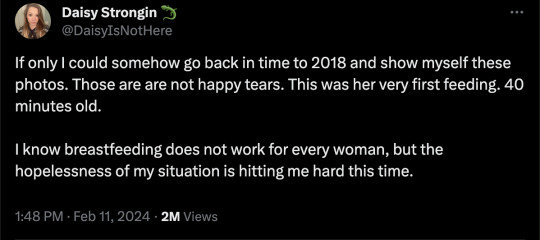
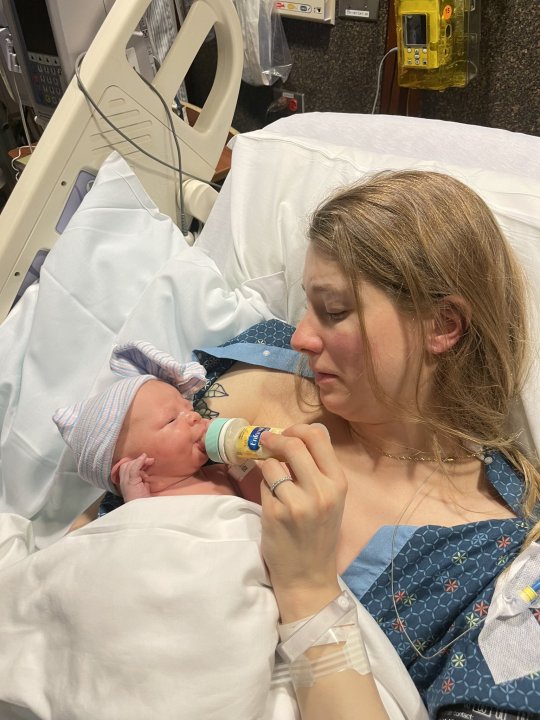
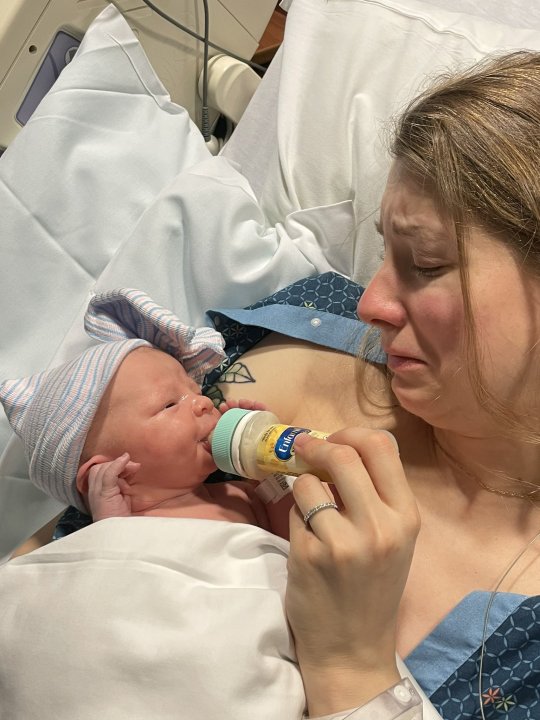

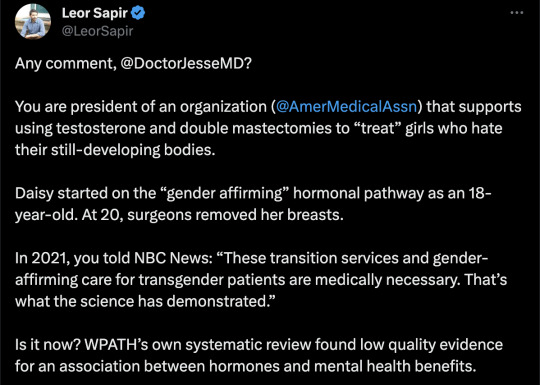
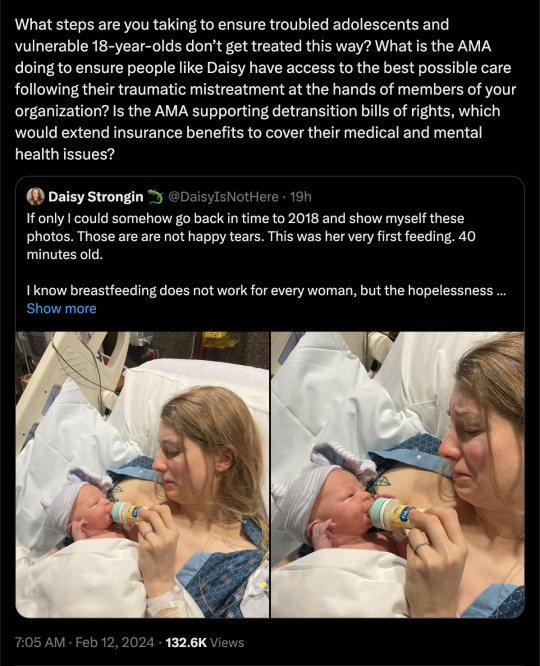
#Leor Sapir#Daisy Strongin#detrans#detransition#detransition rights#double mastectomy#bilateral mastectomy#top surgery#gender ideology#queer theory#iatrogenic harm#medical malpractice#medical corruption#medical scandal#medical transition#American Medical Association#genderwang#gender identity ideology#religion is a mental illness
254 notes
·
View notes
Text
Alyssa Tirrell at MMFA:
Dr. Eithan Haim, a former medical resident at Texas Children's Hospital, was indicted in May for allegedly illegally accessing trans patients’ records, which he subsequently shared with Manhattan Institute senior fellow Chris Rufo. Right-wing media figures have since defended Haim and brought him in for interviews, often equating the care allegedly provided at Texas Children's Hospital — such as the prescription of "puberty blockers" — with harm or mutilation and alleging that Haim is the target of political persecution. The campaign has successfully raised both Haim's profile and at least $888,865, which he claims will be used for both his legal defense and “offensive legal action against those who have abused their professional responsibility in service of radical transgender ideology.”
Haim allegedly illegally accessed trans patients’ records
On February 18, 2022, Texas Attorney General Ken Paxton issued an opinion that qualified youth gender-affirming care as "child abuse", prompting Texas Children's Hospital to announce that it would stop proving such care. Although the opinion was not legally binding, the hospital released a statement announcing that it would stop prescribing gender-affirming hormone therapies. The statement, which also alluded to recent measures that Gov. Greg Abbott had taken against families of children receiving gender-affirming care, added that “this step was taken to safeguard our healthcare professionals and impacted families from potential legal ramifications.” [Office of the Attorney General of Texas, 2/18/22; American Civil Liberties Union, 2/23/22; The Washington Post, 3/8/22]
In late spring 2023, Dr. Eithan Haim allegedly accessed the records of trans patients at Texas Children's Hospital and shared them with Manhattan Institute senior fellow Chris Rufo. Haim, a resident at Baylor College of Medicine who had previously conducted rotations at Texas Children's Hospital, shared redacted files with Rufo that allegedly demonstrated that the hospital was continuing to provide gender-affirming services to minors. [Houston Public Media, 6/10/24; U.S. Attorney's Office, Southern District of Texas, 6/17/24; United States District Court of the Southern District of Texas, 5/29/24]
On June 2, 2023, a Texas bill restricting gender-affirming care for children was signed into law. S.B. 14 prohibited “the provision to certain children of procedures and treatments for gender transitioning, gender reassignment, or gender dysphoria” as well as “the use of public money or public assistance to provide those procedures and treatments.” The law went into effect on September 1 of that year. [Texas legislature, 6/2/23]
[...]
Right-wing media figures platformed Haim in solo interviews, where he defended himself
Since January 2024, with the revelation of his identity, Eithan Haim has appeared as a guest alongside many prominent right-wing media figures. In these interviews Haim neither claimed to have worked directly with trans patients nor disputed sharing the documents with Chris Rufo. Instead, Haim often alleged that he was being unfairly targeted and defended his case on the grounds that the care allegedly provided at Texas Children's Hospital was harmful to pediatric patients.
Right-wing media defend Dr. Eithan Haim’s HIPAA-violating ways of illegally accessing trans patients’ records while at Texas Children’s Hospital in which he shared those records with far-right anti-LGBTQ+ agitator Christopher Rufo.
#Eithan Haim#Christopher Rufo#Christopher F. Rufo#Texas Children's Hospital#HIPAA#Puberty Blockers#Gender Affirming Healthcare#Ken Paxton#Greg Abbott#Manhattan Institute#Leor Sapir#Texas SB14#GiveSendGo#Tucker Carlson#Laura Ingraham#Glenn Beck#Chaya Raichik#Libs of TikTok#Jamie Reed#Gays Against Groomers
41 notes
·
View notes
Text

It contains Spoiler traces if you've seen only The Legend of Vox Machina. Not a character you might know from @criticalrole, he isn't that relevant but Kynan's character growth it's cool to see.
Again, NPC voiced by Matthew Mercer.
#critical role#critical role fanart#critical role art#critrole#critrole fanart#critrole art#cr campaign one#cr fanart#vox machina#vox machina fanart#vox machina art#the legend of vox machina#kynan#kynan leore#chroma conclave#chroma conclave arc#dungeons and dragons#dnd#dnd 5e#rpg#ttrpg#animation#npc#fanart#art#patreon#patreon artist#wacom#clip studio paint
70 notes
·
View notes
Note
How about Cassandra & Kynan for 29? 💛
29. Drumbeat of the Dunmer (Morrowind Soundtrack)
[TW for canon-typical gore and zombie shenanigans. Kept under the cut.]
They should have used the damn teleportation circle.
But nooooo - the carriage rocks as someone crashes into it, then bucks again as the team of horses jostles in terror. Cries and gunshots sound far more distant outside until a bullet rips through the window like cloth.
‘Cass, you need to travel more!’ - Cassandra is rifling through her affects for her rapier. The hilt is perfect in her hands; the blade tears through the dress she’d worn because Vex’ahlia insisted this would be more comfortable for the long journey -
‘There’s so much outside of Whitestone for you to see!’ - what she sees as she opens the door, guard up, is the torso of an undead giant crawling towards a lone rifleman drawing it away. She mistakes the legs for trees, over there, haloed by fresh blood.
‘It’s quite enjoyable!’ he said - she swallows the nausea (to imagine she was once used to the smell) and steps over a body (don’t look, don’t look) to peer past the throng of guards.
“Lady de Rolo!” Trisha snaps, harsher than Cassandra has ever heard her. “Please return to your carriage -”
“What are our losses?”
Her guard hesitates. “Only one.” Better numbers than Cassandra expected - her brother’s rifles are really paying for themselves. “But we have a couple of recruits who won’t be fit to ride, my Lady -”
Cassandra has stopped listening. The crawling giant, entrails trailing after it like festive ribbons, looks about the same size. But the figure it’s chasing is getting smaller and smaller. “Kynan? Trisha, is that Kynan?”
(Captain Leore. Captain Leore, not Kynan, but she’s too scared to maintain professionalism.)
Trisha does not answer; she immediately (and correctly) guesses what Cassandra is about to do and puts that time to better use lunging for her charge. The Guardian of the Woven Stone, however, grew up with six older siblings and easily ducks out of the way. And she runs.
Now that she has a closer look, it’s embarrassing that she did not recognize Kynan sooner: his stupid feathered hat stands out against the Parchwood’s gnarled trees and all the blood. He’s backing up as he reloads, just enough to keep out of the giant’s long reach - but occupied with his task he only occasionally checks the terrain behind him.
Her heart stumbles at the thought of him tripping. The tear in her dress serves her well, splitting wider and wider with each stride as she picks up the pace.
Kynan does not trip; he backs up into a tree, glancing behind himself in shock. And then he trips over its roots as he scrambles to get behind the trunk as the giant lunges at him with a gurgling roar.
Cassandra would like to say she does not think before leaping in to save him.
Except she does think: that the edge of the canopy will potentially impede the arms if it tries to reach up, that the head is so much bigger close to the ground, that even if she’s wrong she can’t not do anything, that it’s Kynan, that Delilah always complained about her creations’ weak point.
One step - her foot sinks into the rotting flesh of its shoulder, stabilizing on the shoulderblade. Another - back of the neck, the vertebrae keep her foot steady. One more - she launches herself onto the head. The cloudy, grey-green pupils begin to look up. They don’t have time to focus on her as Cassandra drives her rapier into the giant’s eye.
Human eyeballs are roughly the size of a golf ball. This is far, far larger. Cassandra is up to her elbow - elbows, two hands on the hilt for more force - in viscous material and fluid, and then up to her shoulder as something gives and the blade hits home.
She’s jostled as the giant’s arm falls with a crash, catching on an unfortunate tree. Breathing heavily, she tugs her rapier. And tugs again. And again.
“Oh, wow.” Kynan says from where he fell. Cassandra does not dare look up. If she keeps staring at what’s left of the massive pupil, at her arm in the pupil, perhaps she’ll be able to - “I - wow. Hang on, I’ve got you.”
Kynan takes her by the shoulders and give a firm tug. It does free her, yes, but it also sends Cassandra skidding down from her precarious perch - Kynan catches her here, too, and steadies her.
The flush of exertion quickly turns into one of embarrassment. Her dress is absolutely ruined. There will be no salvaging this.
Cassandra clears her throat. The effect is ruined by her gasping for breath. “I - well done, Captain Leore. Excellent work. Are you hurt?”
“Yes, my Lady - I mean no!” he stammers. “I’m fine. Thanks to you - so. Thank you, really. And - oh, no. You’ve got something - well.”
Kynan fishes for what turns out to be a pathetically small kerchief. When he steps forward to offer it to Cassandra, he visibly winces. That won’t do. She wedges herself under his arm. His wobbly protests are mostly excuses about bothering her, and not related to how the eyeball goo is now all over him, too.
“Whitestone is only five hours behind us,” Cassandra says, raising her voice (the remainder of the guard detail jumps to attention). “We will turn around and head home to bathe and rest - I’ll organize teleportation to Westrunn tomorrow.”
More quietly, she says, “And you will ride in the carriage with me, understood?”
“Yes, Lady Cassandra,” Kynan says meekly.
(Once they are in the carriage, she uses his kerchief to dab at the mess of blood at his temple, livid and relieved in equal measure. 'Quite enjoyable', he said! Oh, she’ll give Percival one hell of a verbal thrashing when they get back!)
For my Spotify Wrapped Prompt Game!
#first of THREE Morrowind soundtrack ficlets#help Kyssandra as always gets away from me - I wanted her to save him ok <3#critical role#cr fanfic#kyssandra#kynan leore#cassandra de rolo#my writing#spotify wrapped
19 notes
·
View notes
Text

This time, we have seven fics that talk about mentorship! Sometimes for the better, sometimes for worse - and a lot of thoughts about legacy. Check them out behind the cut, and as always - comment and kudos if you like them!
The Slow March of Time by Swan_Song (13737,General) Warnings: Major Character Death/Lifespan angst Pairings: Yussa Errenis & Essek Thelyss & Caleb Widogast, background Shadowgast, QPR Essek and Yussa
Yussa and Essek talk about Caleb, about grief, and about memory.
Reccer says: gorgeous and sad

we all need someone to stay by whyyesitscar (2776,Teen) Warnings: None Pairings: Dairon & Beauregard Lionett, Dairon & Yudala Fon
a short character study on dairon's thoughts and feelings about our favorite punk monk
Reccer says: I liked it

Tiny Monks and Little Mages by devil_seabird_king (ShaaKi) (2011,Teen) Warnings: None Pairings: Beauregard Lionett & Caleb Widogast
When Caleb needs assistance with a lesson, Beau takes the opportunity presented and runs with it. The outcome may just have a lasting impact.
Reccer says: Great Beau voice, and cute!

Unnamed Baby Boy by tfm (1270,Teen) Warnings: Pairings: Dairon & Beauregard Lionett, background Beauyasha
Beau takes her newly adopted son to Zadash. Dairon is unimpressed (or are they??)
Reccer says: Fun and hilarious and adorable

prospective pupils by quinn_of_aebradore (1128,General) Warnings: None Pairings: Essek Thelyss/Caleb Widogast
After a two year break, Caleb begins tutoring another class of Soltryce rejects.
Reccer says: I love the characterization and thought put into the students, and the emotions described for Caleb

Let Others Light their Candles by ChronicBookworm (2801,General) Warnings: None Pairings: Patia Por'co & The Raven Queen, Cerrit Agrupnin & Patia Por'co, Imyr Por'co & Patia Por'co, Maya Agrupnin & Patia Por'co
Patia, her mentors, and the one she never got the chance to mentor.
Reccer says: God, thinking about Patia just kills me and this fic does her justice and gives me so many feelings

kill your heroes by CorvidFeathers (16440,Teen) Warnings: None Pairings: Kynan Leore & Anna Ripley
The ballad of Kynan Leore and Anna Ripley
Reccer says: Amazing fic about a character that doesn't get too much attention - and super clever to boot

This is one of our weekly communally-generated gen rec lists. Every week we announce a new theme and allow anyone to submit a fic recommendation. Please note that the summary and content notes are provided by the reccer, and may be different than what the author has provided. Please assume good intentions all around. <3
And hey, anyone includes you!
We'll be back on the first with Scanlan Recs - then on the fifteenth with fics featuring dreams.
Any fics coming to mind? Well, then use this form to submit! If you're looking for some more, check out some fics written in the critter genfic bingo tag, or the older rec lists! Or you can request your own card and join in on the fun!
#critical role#critter genfic rec lists#kynan leore#anna ripley#patia por'co#the raven queen#maya agrupnin#essek thelyss#caleb widogast#beauregard lionett#Dairon Cr#yussa errenis
18 notes
·
View notes
Text

Another day another Kynan.. but also Jarett Howarth... I can't believe these guys.. Tal'Dorei is burning and they're just taking chilling at whitestone?? Smh tsk tsk 😞😔
#digital art#character art#digital aritst#art#commisions open#drawing commissions open#digital commisions#dnd#critical role#jarett howarth#kynan leore#the legend of vox machina#vox machina#vox machina fanart#criticalrole campaign1#campaign 1#criticalrolecampaign1#criticalrole fanart#critical role art#criticalrole#cr spoilers#whitestone#tal'dorei#taldorei#critical role exandria
68 notes
·
View notes
Text

Leore Hayon by © Emman Montalvan
11 notes
·
View notes
Text
conas a déarfá "real and true" as gaeilge? ní dóigh liom go n-oibríonn "fíor agus fíor" lol. b'fhéidir "ráiteas fíor" ach níl sé chomh spraoi. níl a fhois agam lol
5 notes
·
View notes
Text
Keyleth: Imagine if someone handed you a box full of all the items you have lost throughout your life Cassandra: Self-esteem, haven't seen you in years! Percy: Oh wow, my childhood innocence! Thank you for finding this! Kynan: I knew I lost that potential somewhere! Vax: My moral code, is that you? Keyleth: Keyleth: I was just gonna show you this cool trunk my mother left me but do you guys need a hug?
#critical role#campaign one#incorrect quotes#kynan leore#cassandra de rolo#percival de rolo#percy de rolo#kynan#vaxildan#vax'ildan#keyleth#trauma
37 notes
·
View notes
Text

cassandra and delilah’s relationship continues to fascinate me
#it’s not WIP wednesday for another 38 minutes but here we are#this is from my attempted collection of snippets i’ve written for a let it linger sequel#aka the kynan cassandra fic that is less introspection and more kynan going down on cass— WHO SAID THAT#there is also introspection don’t worry#critical role#cassandra de rolo#kynan leore
9 notes
·
View notes
Text
If you think the 2012 April x Donnie romance was bad then just know that in the very first draft/concept for the 2012 show ALL of the Turtles were gonna be in love with April as well as having her being an “emotional substitute” for the boys cause the story was gonna take place after Splinter's death.
#2012 apritello doesn’t look so bad now huh?#so they wanted her to be a replacement parental figure while also having them all crush on her??#huh looks like leor*I wasn’t the first sweet home Alabama in this series#eventually they switched it to only being Raph to crush on her as a way to show his soft side but the writers didn’t like it#so they gave him a pet instead#thank god for that!#I wouldn’t have been blessed with 2012 RaMona!!#plus I read somewhere once that it was Rob Paulson who convinced the writers to switch it to Donnie crushing on her#I think they said they wanted to explore more of Donnie character other than him being smart#but don’t quote me on that#random thoughts#tmnt 2012#tmnt#teenage mutant ninja turtles#tmnt leonardo#tmnt raphael#tmnt donatello#tmnt michelangelo#tmnt april#april o'neil
59 notes
·
View notes
Text
By: Leor Sapir
Published: Dec 5, 2024
An astonishing moment took place yesterday at the Supreme Court during oral arguments in U.S. v. Skrmetti, the case that challenges Tennessee’s ban on pediatric sex “change” procedures. Chase Strangio, the American Civil Liberties Union’s attorney, admitted to Justice Samuel Alito that the narrative around the risk of suicide in transgender-identified youth is false.
Before Alito and Strangio’s exchange, Justice Sonia Sotomayor had asked U.S. Solicitor General Elizabeth Prelogar about minors with gender dysphoria who “attempt suicide.” Prelogar responded that the “rates of suicide”—not “attempts,” but actual death by suicide—in that population “are striking.” Given the government’s support for puberty blockers and cross-sex hormones as treatments for gender dysphoric youth, the clear implication of Prelogar’s remarks was that such interventions are known to prevent these tragic and, in her view, common events.
JUSTICE SOTOMAYOR: Some—some children suffer incredibly with gender dysphoria, don’t they? GENERAL PRELOGAR: Yes. It’s a very serious medical condition. JUSTICE SOTOMAYOR: I think some attempt suicide? GENERAL PRELOGAR: Yes. The rates of suicide are—are striking—
This claim—that rates of suicide among gender-dysphoric young people are high—constitutes the trans suicide myth.
When it was Strangio’s turn, Justice Alito asked, “Do you maintain that the procedures and medications in question reduce the risk of suicide?” The transgender-identifying attorney responded:
MR. STRANGIO: I do, Justice Alito, maintain that the medications in question reduce the risk of depression, anxiety, and suicidality, which are all indicators of potential suicide.
Note that Alito asked about suicide, and Strangio answered about suicidality—the latter of which refers to thoughts of or intent to attempt suicide. Though suicide would be preceded by suicidality, research does not show that suicidality is a reliable predictor of suicide. According to the Centers for Disease Control and Prevention, in 2022, for every one person who committed suicide, 270 people “seriously thought about suicide” and 33 attempted it.
Strangio’s pivot to suicidality is a standard tactic of gender medicine activists in public debates. They exploit public ignorance about the difference between suicidality—thinking about suicide, attempting suicide, using gestures of self-harm as a cry for help or as a form of emotional manipulation—and actual death by suicide.
Unfortunately for Strangio, Justice Alito had done his homework. Citing the U.K.’s Cass Review, Alito observed that “there is no evidence that gender-affirmative treatments reduce suicide.”
Then came Strangio’s remarkable concession:
MR. STRANGIO: What I think that is referring to is there is no evidence in some—in the studies that this treatment reduces completed suicide. And the reason for that is completed suicide, thankfully and admittedly, is rare and we’re talking about a very small population of individuals with studies that don’t necessarily have completed suicides within them. However, there are multiple studies, long-term longitudinal studies that do show that there is a reduction in—in suicidality . . .
Here, the ACLU’s star attorney on trans issues seems to be at odds with Solicitor General Prelogar, who had said that the “rates” of “suicide” among gender-dysphoric youth were “striking.” Strangio admits, under oath, that suicide is actually “rare,” and that the research purporting to demonstrate benefits from hormones concerns suicidality, not suicide. Strangio’s use of “admittedly” is also striking, as it suggests the attorney is aware that claims about suicide prevention through sex “change” are false.
Strangio’s claim that the evidence shows these treatments reduce suicidality is also false. Some studies claim to find that, but existing systematic reviews of evidence have concluded that these claims are not credible due to methodological problems in the research. The Cass Review explicitly cites “major methodological problems” as a reason to be skeptical of studies claiming that “gender-affirming care” reduces “suicidality.” I suspect that Strangio knows this, as well.
None of this means that we shouldn’t take suicidal attempts or ideation seriously. Of course we should. But to equate these behaviors with completed suicide and to use that equivalence as a justification for harmful and experimental treatments on vulnerable adolescents is extremely irresponsible.
It’s hard to exaggerate the importance of Strangio’s concessions yesterday. Transgender activists and their media allies, gender clinicians, and Democrats have consistently and emphatically told the public that suicide is a serious risk for transgender-identified youth and that “gender-affirming care” is necessary to mitigate that risk.
Strangio’s ACLU itself has said this on many occasions, as I previously reported. The ACLU of Wisconsin, for instance, issued a press release in 2023, stating: “Research shows it [denying youth access to ‘gender-affirming care’] contributes to… suicide. On the contrary, transgender youth whose families support their gender identity have a 52% decrease in suicidal thoughts [and] a 48% decrease in suicide attempts.” The following year, the ACLU of South Carolina quoted a physician who said, “Gender-affirming care is life-saving suicide prevention care.”
More egregiously, clinicians have used the suicide threat to cajole parents into agreeing to irreversible medical interventions that can potentially leave their kids sterile, sexually dysfunctional, disfigured, and with lifelong impacts on bone and cardiovascular health. “Would you rather have a dead daughter or a live transgender son?” they ask the parents, sometimes in front of the child.
Crucially, the risk these activists invoke is suicide, not suicidality. Parents are asked to weigh the amputation of their daughters’ breasts or the sterilization of their sons against losing their kids to suicide—any parent’s worst nightmare. If the risk in question were suicidality, that would likely change their calculus.
Consider, as a representative example of activists’ claims, these remarks by Diane Ehrensaft, a San Francisco-based psychologist and pioneer of the “gender-affirming” approach in the United States, in her 2016 book, The Gender Creative Child:
Time and again I watch youth weigh keeping their fertility options open against postponing obtaining their true gender identity, and time and again I watch the decision to affirm their gender and forgo fertility win out. Can a thirteen-year-old truly know that? Yes, I think so, in the same way that a thirteen-year-old is capable of making a choice that will save their life even if it means losing a limb or living with one kidney. We could say, “Well, yes, but that’s a matter of life and death.” So is this for many gender creative youth—to affirm their gender or face crushing despair.
The existing research on the link between gender-related distress and suicide undermines this claim. It includes four findings: first, individuals who identify as transgender or experience distress associated with their sex are at higher risk of suicide than age-matched controls. Second, however, that risk, though elevated, is quite low, as Strangio now concedes. (For example, the suicide rate among youths referred to the U.K.’s Gender Identity Development Service between 2010 and 2020 was 0.03 percent.) Third, the elevated risk is best explained by psychiatric comorbidities, which are extremely common in this population and hypothesized to contribute to transgender identification in youth. Fourth, adults who undergo full “gender reassignment” remain at elevated risk for suicide relative to matched controls even years after their procedures.
Suicide, in other words, is a complex problem that requires nuance and understanding. Suicide-prevention experts have long argued that talking about suicide in the way that Strangio and the ACLU have done is irresponsible: suicide is a socially contagious behavior, and telling youth in distress that it is the expected response to their problems can encourage the very behavior these activists purportedly want to prevent.
In 2017, major LGBT rights organizations partnered with suicide prevention experts and groups to produce a guideline for how to discuss suicide in this population. Among their recommendations:
DON’T attribute a suicide death to a single factor (such as bullying or discrimination) or say that a specific anti-LGBT law or policy will “cause” suicide. Suicide deaths are almost always the result of multiple overlapping causes, including mental health issues that might not have been recognized or treated. Linking suicide directly to external factors like bullying, discrimination or anti-LGBT laws can normalize suicide by suggesting that it is a natural reaction to such experiences or laws. It can also increase suicide risk by leading at-risk individuals to identify with the experiences of those who have died by suicide.
I have since come to learn—through a source close to the movement with contacts at the ACLU—that suicide researchers supportive of LGBT rights are deeply concerned with how transgender activists like Strangio have bullied advocacy group leaders and manipulated the suicide issue to serve their own personal agendas. Strangio and other transgender activists are continuously undermining public trust in the ability of these groups to generate or endorse credible suicide prevention guidelines.
But the narrative is too politically useful for many of these activists to abandon. Shorn of any ability to persuade the public of their incoherent ideas about sex and gender, and unconcerned that their practices violate centuries of accumulated knowledge about healthy child development, transgender activists need the suicide narrative to be true—or at least believable. How else can they get parents to submit their kids to the cult of the scalpel and syringe?
#Leor Sapir#trans or suicide#suicide#suicidality#suicide ideation#Chase Strangio#ACLU#gender ideology#queer theory#gender identity ideology#affirm or suicide#gender affirmation#gender affirming care#gender affirming healthcare#Cass review#Cass report#suicide narrative#religion is a mental illness
42 notes
·
View notes
Text

Some Vox Machina doodles ✨
#vaxildan#vax'ildan#percy de rolo#percival de rolo#percival fredrickstein von musel de rolo iii#kynan leore#vexhalia#vex’ahlia#taryon darrington#critical role#critical role fanart#cat au#catified#critical role cat au#the legend of vox machina#vox machina#warrior cats au#my art
33 notes
·
View notes